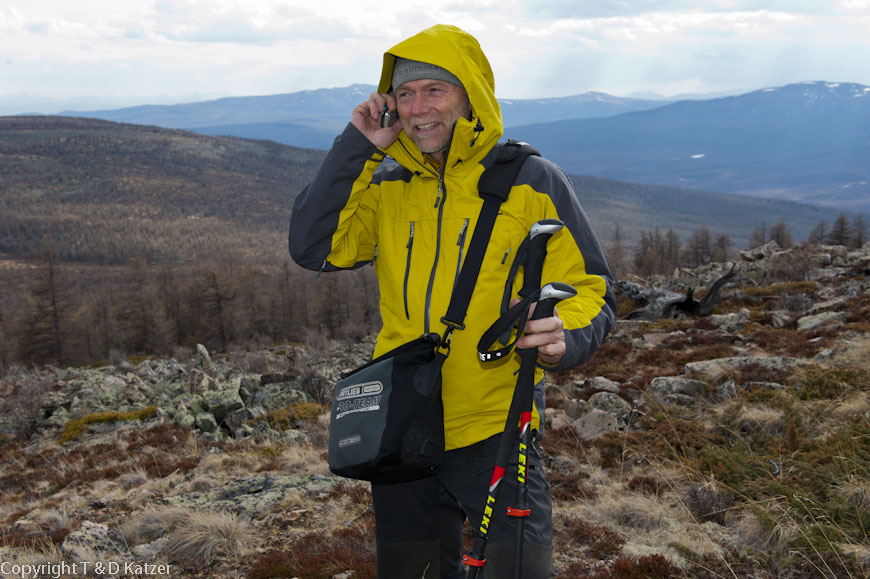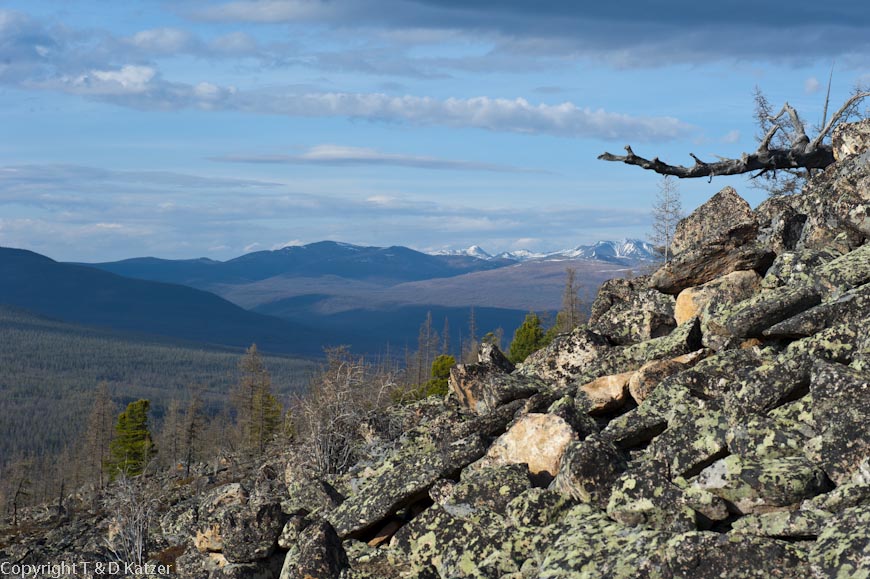
Farewell – At windy heights
N 51°39'155'' E 099°21'977''
Day: 318
Sunrise:
05:06
Sunset:
21:35
Total kilometers:
1361
Soil condition:
Grass
Temperature – Day (maximum):
25 °C
Temperature – day (minimum):
19 °C
Temperature – Night:
minus 5 °C
Latitude:
51°39’155”
Longitude:
099°21’977”
Maximum height:
1858 m above sea level




“As a reminder of us,” says Ultsan and hands me a reindeer made from reindeer horn. “Oh, thank you very much. It’s a beautiful piece of work. “Did you carve that?” I ask, impressed. “Tijmee,” he replies, nodding. “I’ll cherish it,” I say. “And this is for you,” says Tsaya and gives Tanja a small bag made of gazelle skin, which also contains a carved reindeer head. “We will ride to Tsgaan Nuur today. I have to go to Mörön to have my heart checked and Ultsan has had a bad toothache for days. He will see a dentist there. We actually wanted to wait until you leave to give you a proper farewell, but we get a ride from Tsagaan Nuur to Mörön. That’s why we have to say goodbye now,” explains Tsaya. “We will never forget the time we spent with you,” I say. “Neither do we. Your presence has enriched us and shortened many a long winter day,” Tsaya replies. We talk for a while longer. Then our two hosts leave the tipi to saddle their horses.
“We should go to them now and share my last bottle of vodka with them,” suggests Bilgee. “In the morning?” I ask. “Denis, we’re in Mongolia. People there drink vodka at any time of day and on any occasion,” Tanja reminds me. “How could I forget that,” I reply with a laugh. A little later we are sitting in Tsaya and Ultsan’s tipi. Ovogdorj, Ultsan’s brother Hoo, his uncle Bayandalai and Shagai are also present. Without further ado, Bilgee unpacks the bottle. It opens immediately. As we are the ones who have been saying goodbye to the Tuwa since our first meeting about eight months ago, I would like to take this opportunity to make a short speech of thanks. I bless the drink according to Mongolian custom, tap my right ring finger into the clear liquid and flick it in all directions so that the nature spirits get their share and are appeased. In a few words, I would like to thank you for your open welcome into the Tuwa community and for letting us share in your life. “Tanja and I documented our experiences together in great detail during our stay and hope to have left posterity a true-to-life document of your life in the taiga. We experienced first-hand the challenges you have to overcome, the health problems that make your life out here difficult and how you have to brave the often merciless nature. We can now understand why you, as one of the last originally existing nomads, prefer this simple life to civilization despite all the adversities. Even if it is difficult and sometimes dangerous to be exposed to nature and its forces, this pure way of life means fulfillment. Far away from the industrial stress that, as I know from my own experience, kills many people prematurely. Far away from the civilized world that many people like so much without understanding the high price to be paid for it. Excessive consumption, personal ambition and other reasons lead to people allowing themselves to be taken advantage of. The world out there is degenerating more and more into a kind of modern slavery. A slavery that forces so many people to work up to 16 hours a day for little money. And that just to be able to participate in the supposedly important consumption. A nightmare from which there is hardly any awakening. In comparison, your life in the taiga is preferable. Keep up the good work. Unfortunately, the modern world is spreading like a disease to every corner of the earth. Cell phones, for example, are penetrating the remotest regions like a virus. Maintaining an original way of life seems impossible. Meanwhile, chainsaws, batteries, small electrical appliances and even a moped have conquered your world. This is the beginning of the spiral of consumption that makes us humans dependent and ultimately leads to modern slavery. You are forced to earn money for all these goods that make our lives easier at first glance and this is precisely where the danger of losing your original way of life lies. But Tanja and I wish you, your families and reindeer many more carefree years in the taiga,” I say, concluding my speech.
Tsaya translates my words. After it ends, there is a brief silence, then nodding in agreement. “Hubaaa!”, I say loudly and down my glass of vodka. “Hubaaa!” the attendees reply with laughter and the atmosphere is relaxed and exuberant. “You are very good people,” Ovogdorj takes the floor. “We were happy to have you here. I can remember every party you threw and celebrated with us. It was a great time. We hope you’ll come again,” he says and does the same to me, letting his glass evaporate with a big lift.
“When you leave, you will leave a gap that will be difficult to fill. We have come to love and appreciate you. We laughed together and shared the odd drama. Now we know that Europeans are also capable of surviving such a harsh winter with flying colors. We pay tribute to you. You are the first Europeans to share life with us. Not for a few days, but for the entire winter and spring. You are no longer strangers to us but part of our big family. Everyone present lost their shyness towards you. By living with you, we will see the coming tourists who visit our summer camp with different eyes. You have taught us a lot. We would like to thank you from the bottom of our hearts,” we hear Tsaya say. “Hubaaa!”, I shout and try to wipe a few tears from my eyes inconspicuously with my shirt sleeve. Tanja and I are touched by the kind words. “Another little present for you,” says Ultsan and hands Tanja a gazelle’s foot with a leather thong tied to it. “That’s to be able to drive your horse better. We say that the light tap of a gazelle’s foot on a horse’s backside makes it as fast as a gazelle,” he explains. Tanja is visibly impressed and thanks us once again. After the bottle has been emptied, we sit down together for a farewell photo. Then Tsaya and Ultsan leave their tipi to ride towards Tsagaan Nuur.
At windy heights
At 3 p.m. we set off to climb the 2,300-metre-high mountain to get mobile phone contact from its summit. The ascent through the larch forest and dense undergrowth is arduous. From an altitude of 2,000 meters, the forest becomes increasingly sparse and is pushed back by a rough scree field. Careful not to stumble into one of the countless small crevices, we climb towards the summit meter by meter. Bilgee, who was up there yesterday to talk to his children on the phone, knows the way and leaps ahead like a chamois. Once we reach the top, a cold wind blows against us. Dark clouds open their gates and rain lashes into our faces. While the weather in the valley was still pleasant, it is now extreme again. A change that belongs to this part of the country like sunrise and sunset belong to a day. Before we pull out our cell phones, we enjoy the breathtaking panoramic view over the seemingly endless mountain ranges, some of which are covered in snow. From our eagle position, you can see how the larch forests are slowly coming to life. The light green stretches like a blanket through the valleys and over the heights. Only a few small lakes are still covered in white ice. It won’t be long before they too are licked up by the sun and the clouds are reflected in their blue waters.
I actually get in touch with Saraa straight away. “And were you able to take our luggage that we had stored at Ayush’s with us to Tsagaan Nuur?” is my first question. “Not everything. We rented a jeep. We couldn’t fit all the equipment in there. But don’t worry, we’ll get the rest away somehow.” “Okay, good. And what about a new horseman?” “The young wrestler I was talking about wants to accompany you. He’s currently in the country building a log cabin. If all goes well, he’ll be back in Mörön on June 15,” I hear. “That’s too late. Then he’ll need another two days to get to Tsagaan Nuur. Is there another alternative?” “No. Naraa’s son is working. I didn’t know that. At the moment, the young man is the only option,” I hear disappointedly. “Okay, we’ll break up our tents here tomorrow and walk to Tsgaan Nuur. I’ll let you know as soon as we get in touch with the network. Maybe we’ll come up with a solution by then,” I end the phone call. The strong wind makes us hurry to leave the summit as quickly as possible. Concentrating, we set off on the arduous descent over the scree field and reach our tipi two hours later, safe and sound.
We look forward to your comments!

